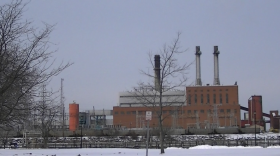With the backdrop of a changing energy landscape in New York, the state’s Public Service Commission (PSC) is considering the future of two coal-fired power plants in the upstate region.
The NRG plant in Dunkirk and the Cayuga Operating plant in Lansing both face a similar problem; they’re no longer considered viable businesses due to the low price of natural gas, but they’re too important to the reliability of the New York electricity grid to shut down.
Both companies have proposed repowering with natural gas as a solution, making the facilities cheaper and cleaner to run.
The counter-proposal is to let the plants close and replace them with upgraded transmission lines, bringing power in from elsewhere.
The PSC will have the final word, but this month they’ve allowed the public to weigh in on the debate.
And, they’ve received a considerable amount of input.
Hundreds of people turned out earlier this week to have their say on the future of the Cayuga facility. And, Lansing Town Supervisor, Kathy Miller, says the message from locals is clear.
“The sentiment of the town is certainly in favor of repowering the Cayuga facility,” Miller says.
But, she says not everyone at the public hearing was of the same mind.
“There were a lot of people at the public hearing who did not want the plant repowered, but I would say most, if not all of those people, were not from the town of Lansing. Some of them were from far away counties like Stueben and areas like that, but who came to our meeting.”
Miller says roughly one third to one half of the 800 people at the meeting were not from the local area, but they came to oppose the repowering solution because of fracking and environmental concerns.
While those concerns may be valid, she says, the simple fact is that if the plant closes the town would lose both jobs and millions in tax revenue.
“It would decrease the amount of tax money that the town takes in by 7.36 percent.”
And, she says, the school district would fare even worse, possibly having to cut jobs.
Kim Teplitzky, spokeswoman for environmental group the Sierra Club, says the issue goes beyond the local towns which rely on these power plants.
She says towns like Dunkirk and Lansing should be given assistance if the plants close, but the state can’t afford to continue relying on dirty fuel. And, while natural gas is a cleaner alternative, it’s still just swapping one fossil fuel for another.
“Switching from one fossil fuel to another would just mean that there’s more pollution and worsening the impact of climate disruption which is a really expensive problem for places like New York. When you look at the costs of flooding, heat waves, hurricanes, we just can’t afford to continue relying on these outdated fossil fuels,” Teplitzky says.
“Instead, if we switch to transmission upgrades to replace this plant, that helps keep the door open so that we can be moving toward the clean energy future that we really need for New York with things like wind and solar power.”
While this line of thinking was well represented at the public hearing in Lansing, the PSC heard overwhelming support for only one solution in Dunkirk earlier this month.
More than 2,000 people turned out to the public hearing in Chautauqua County, and the large majority came out in support of the NRG repowering project for the Dunkirk facility.
NRG’s John Baylor says it comes down to economics. NRG is the single largest tax-payer in Dunkirk, and the greater Chautauqua County area.
“Many of the people who came out to support the repowering option were there to talk about not just the reliability reasons for the repowering, but there was a lot of focus placed on the economic benefits of having a plant,” Baylor says.
“Members from the school district were there talking about the impacts to the teaching jobs in the area. There was a member of the Boys and Girls club who talked about what kind of a civic partner NRG was and what we meant to the various civic associations. There was a member from one of the local banks.”
Baylor says the public hearing left them quietly optimistic that the PSC will see things their way.
“One of the things that they strongly consider is what the ratepayer wants and I think this [hearing] gave the PSC a clear view of what the ratepayer in western New York wants as far as their options go.”
The public comment period for solutions at both the Dunkirk and Cayuga plants is open until August 16.






